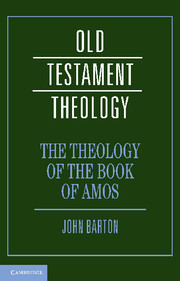Book contents
- Frontmatter
- Contents
- General Editors’ Preface
- Preface
- Abbreviations
- Chapter 1 Amos: The Critical Issues
- Chapter 2 Religious Belief and Practice in Amos’s Day
- Chapter 3 The Theology of Amos and His Circle
- Chapter 4 Theological Themes in the Additions to the Book of Amos
- Chapter 5 The Theology of the Book of Amos
- Chapter 6 The Reception of the Theology of Amos
- Chapter 7 The Theology of Amos Then and Now
- Further Reading
- Author Index
- Scripture and Apocrypha Index
- References
Chapter 1 - Amos: The Critical Issues
Published online by Cambridge University Press: 05 June 2012
- Frontmatter
- Contents
- General Editors’ Preface
- Preface
- Abbreviations
- Chapter 1 Amos: The Critical Issues
- Chapter 2 Religious Belief and Practice in Amos’s Day
- Chapter 3 The Theology of Amos and His Circle
- Chapter 4 Theological Themes in the Additions to the Book of Amos
- Chapter 5 The Theology of the Book of Amos
- Chapter 6 The Reception of the Theology of Amos
- Chapter 7 The Theology of Amos Then and Now
- Further Reading
- Author Index
- Scripture and Apocrypha Index
- References
Summary
A study devoted to the “The Theology of the Book of Amos” sounds as though it is meant to bypass the issues that have normally been the preserve of “the historical-critical method” – issues about the historical origins of the book, the context in which the prophet lived and worked, and the possibility of additions and changes to his original words. Contemporary biblical study has rightly put back on the agenda the need to interpret the finished product, the book as it lies before us when we open a Bible, and not to spend all our energies on “genetic” questions about how the book came to be, or on trying to identify an original core. But these conventional critical issues cannot be easily bypassed. Most books in the Old Testament are almost certainly the result of a long period of compilation, and the various stages through which they passed have implications for their meaning even as they now stand. In turn, intuitions about their meaning often condition our hypotheses about how they came to be. So we cannot avoid discussing historical-critical matters as a prelude to trying to analyze the theology of this prophetic book. In point of fact, this, too, is part of the mandate of the present series in which the present book is appearing.
The interwovenness of interpretative and critical issues can be seen most clearly if we begin with the most extreme critical positions. There are still scholars who defend the derivation of the entire book, or all but a few small fragmentary additions, from the eighth-century prophet Amos himself: examples include John H. Hayes and Shalom M. Paul. For them, the prophet delivered a message to both the Hebrew kingdoms, which included both judgment to come and a following period of peace and prosperity – which is how the message of most biblical prophets appears in the books as we now have them. In this view, because it is quite thinkable that Amos would have uttered this combined message of judgment and hope, there is no reason to “delete” (to use the older critical vocabulary) the “epilogue” in 9:11–15 from the book as a later addition.
- Type
- Chapter
- Information
- The Theology of the Book of Amos , pp. 1 - 51Publisher: Cambridge University PressPrint publication year: 2012



